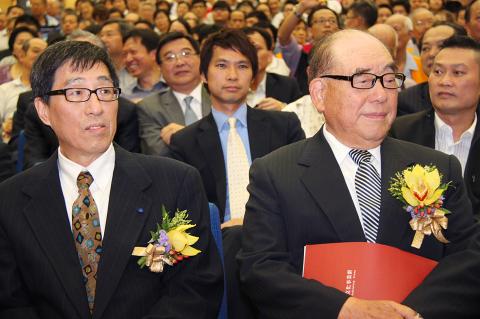Beijing must work with Taiwan toward “reunification” through a new mechanism of “Chinese-style” democracy that would limit the political arena to only a few political parties, former premier Hau Pei-tsun (郝柏村) has said.
Hau, who delivered a keynote speech at the City University of Hong Kong on Friday, said that only when China abandons the threat of force against Taiwan and the two sides embrace “Chinese-style” democracy will the “Chinese dream” be accomplished, the South China Morning Post reported on Sunday.
In recent years, Beijing has increasingly relied on forums in Hong Kong and China to further its “united front” work by inviting senior Chinese Nationalist Party (KMT) members, retired Taiwanese generals and even a select number of Democratic Progressive Party (DPP) members, such as former premier Frank Hsieh (謝長廷), to attend.

Photo: CNA
“The premise for democracy should be to stop the fighting between Chinese people [sic] and to end the era of political power that grows out of the barrel of a gun, which are key elements to realizing the ‘China dream,’” the Post quoted Hau as saying.
The 94-year-old said that examples of peaceful liberalization and democratization in Taiwan following the death of president Chiang Kai-shek (蔣介石) in 1975 and during the Chiang Ching-kuo (蔣經國) and Lee Teng-hui (李登輝) presidencies could serve as a model for China.
“The future development of cross-strait relations should stick to ‘no war, no [Taiwan] independence and gradual unification,’” Hau said.
Hau said that “Chinese-style” democracy would be an alternative to democracy as it is practiced in the West — and in Taiwan — where theoretically, if not in practice, there is no ceiling on the number of political parties.
“Taiwan started democratic reform to end one-party rule and lifted a press ban when the domestic economy was taking off in the 1980s,” Hau said, repeating the disputed belief that as they become wealthier, Chinese are likely to desire a relaxing of the political system.
Under “Chinese-style” democracy, the number of political parties would be limited to just a few.
“Only major parties with at least 20 percent of public popularity would qualify to nominate candidates,” Hau said, a proposal that, with Taiwan and China treated as a single polity, would almost certainly bring about the demise of both the DPP and the KMT, not to mention Taiwan’s smaller parties.
There is no evidence at this point that the Chinese Communist Party, which under Chinese President Xi Jinping (習近平) has hardened its grip on Chinese society, would brook the presence of political competitors, especially parties with the ability to garner 20 percent of public support.
Hau caused a stir late last month when, addressing the “Witness Taiwan Democracy” forum organized by the Taiwan Foundation for Democracy, he denied that Taiwan was a sovereign nation and added that no democratic country — presumably a unified China — can accommodate two different democratic systems.
“When people on both sides of the Strait reach a consensus on their political system, unification will come to fruition naturally,” he said at the time.

ANOTHER EMERGES: The CWA yesterday said this year’s fourth storm of the typhoon season had formed in the South China Sea, but was not expected to affect Taiwan Tropical Storm Gaemi has intensified slightly as it heads toward Taiwan, where it is expected to affect the country in the coming days, the Central Weather Administration (CWA) said yesterday. As of 8am yesterday, the 120km-radius storm was 800km southeast of Oluanpi (鵝鑾鼻), Taiwan’s southernmost tip, moving at 9kph northwest, the agency said. A sea warning for Gaemi could be issued tonight at the earliest, it said, adding that the storm is projected to be closest to Taiwan on Wednesday or Thursday. Gaemi’s potential effect on Taiwan remains unclear, as that would depend on its direction, radius and intensity, forecasters said. Former Weather Forecast

As COVID-19 cases in Japan have been increasing for 10 consecutive weeks, people should get vaccinated before visiting the nation, the Centers for Disease Control (CDC) said. The centers reported 773 hospitalizations and 124 deaths related to COVID-19 in Taiwan last week. CDC Epidemic Intelligence Center Director Guo Hung-wei (郭宏偉) on Tuesday said the number of weekly COVID-19 cases reported in Japan has been increasing since mid-May and surpassed 55,000 cases from July 8 to July 14. The average number of COVID-19 patients at Japan’s healthcare facilities that week was also 1.39 times that of the week before and KP.3 is the dominant

The Chinese Communist Party’s (CCP) working group for Taiwan-related policies is likely to be upgraded to a committee-level body, a report commissioned by the Mainland Affairs Council (MAC) said. As Chinese President Xi Jinping (習近平) is increasingly likely to upgrade the CCP’s Central Leading Group for Taiwan Affairs, Taiwanese authorities should prepare by researching Xi and the CCP, the report said. At the third plenary session of the 20th Central Committee of the CCP, which ended on Thursday last week, the party set a target of 2029 for the completion of some tasks, meaning that Xi is likely preparing to

US-CHINA TRADE DISPUTE: Despite Beijing’s offer of preferential treatment, the lure of China has dimmed as Taiwanese and international investors move out Japan and the US have become the favored destinations for Taiwanese graduates as China’s attraction has waned over the years, the Ministry of Labor said. According to the ministry’s latest income and employment advisory published this month, 3,215 Taiwanese university graduates from the class of 2020 went to Japan, surpassing for the first time the 2,881 graduates who went to China. A total of 2,300 graduates from the class of 2021 went to the US, compared with the 2,262 who went to China, the document showed. The trend continued for the class of 2023, of whom 1,460 went to Japan, 1,334 went to